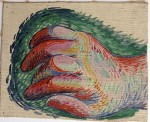 Retired electrician Pierre Le Guennec showed up at the Picasso Administration — the agency that administers his estate — on September 9 carrying a suitcase full of 175 previously unknown works by Pablo Picasso. Le Guennec claimed the artist’s last wife, Jacqueline, gave them to him as gifts after he installed alarm systems in several of Picasso’s houses, and that he had another 100 or so in a trunk in his garage. He had sent the PA pictures of some of the works in January, but they weren’t high enough quality for the experts to authenticate, so he brought them in for a live examination.
Retired electrician Pierre Le Guennec showed up at the Picasso Administration — the agency that administers his estate — on September 9 carrying a suitcase full of 175 previously unknown works by Pablo Picasso. Le Guennec claimed the artist’s last wife, Jacqueline, gave them to him as gifts after he installed alarm systems in several of Picasso’s houses, and that he had another 100 or so in a trunk in his garage. He had sent the PA pictures of some of the works in January, but they weren’t high enough quality for the experts to authenticate, so he brought them in for a live examination.
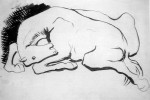 Claude Picasso, Pablo’s son and head of the Picasso Administration, didn’t believe him. At first he thought they were fakes. They aren’t signed or dated, but when the experts examined the pieces closely they found many of them were numbered using a secret system Picasso used and the collection displayed such an adept use of a variety of techniques to make forgery highly improbable if not impossible. So Claude grudgingly accepted that the works were authentic. He didn’t buy the gift story at all, though, and promptly filed suit for illegal receipt of the works.
Claude Picasso, Pablo’s son and head of the Picasso Administration, didn’t believe him. At first he thought they were fakes. They aren’t signed or dated, but when the experts examined the pieces closely they found many of them were numbered using a secret system Picasso used and the collection displayed such an adept use of a variety of techniques to make forgery highly improbable if not impossible. So Claude grudgingly accepted that the works were authentic. He didn’t buy the gift story at all, though, and promptly filed suit for illegal receipt of the works.
Last month, French police raided the Le Guennec’s home and confiscated the trove. They arrested Pierre but released him shortly thereafter. They’re keeping the collection while they investigate the allegations.
“This was a gift,” Danielle Le Guennec told The Associated Press by phone from their home in the town of Mouans-Sartoux, near the tourist Riviera hotspot of Antibes. “We aren’t thieves. We didn’t do anything wrong.”
She said the couple decided to come forward with the works this year because they were getting on in years, and “didn’t want to leave any headaches to our children” with their own estate. Her husband had undergone a cancer treatment operation in March, she said.
The works, which were kept in a trunk, didn’t appear to be much to her untrained eye, she said: “But even if this was a little jot of the pencil, it did come from the master.”
“These aren’t tableaus like the ones sold in America.”
Claude Picasso, quoted in Liberation, noted that his father was known for his generosity – but that he always dedicated, dated and signed his gifts, as he knew that some recipients might try to sell the works one day.
“To give away such a large quantity, that’s unheard-of. It doesn’t hold water,” Claude Picasso was quoted in Liberation as saying. “This was part of his life.”
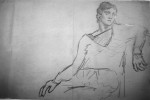 Claude says his father was a bit of a hoarder. He kept everything from subway tickets to bits of string. The notion that Pablo Picasso would have given away such a huge number of his works is utterly alien to his established patterns of behavior.
Claude says his father was a bit of a hoarder. He kept everything from subway tickets to bits of string. The notion that Pablo Picasso would have given away such a huge number of his works is utterly alien to his established patterns of behavior.
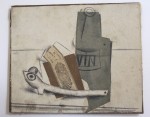 The works were from his early, most prolific period, between 1900 and 1932. Among them are drawings, lithographs, portraits — including of his first wife, Russian ballerina Olga Khokhlova — watercolors, sketches and models for some of his most famous works, a painting from his Blue Period, and 9 collages that were described by critics in 1912 as “painted proverbs” but were thought to have been lost when Picasso’s studio was flooded.
The works were from his early, most prolific period, between 1900 and 1932. Among them are drawings, lithographs, portraits — including of his first wife, Russian ballerina Olga Khokhlova — watercolors, sketches and models for some of his most famous works, a painting from his Blue Period, and 9 collages that were described by critics in 1912 as “painted proverbs” but were thought to have been lost when Picasso’s studio was flooded.
The estimated market value of this hoard according to the Picasso Administration is around $79 million. The Le Guennecs claim they didn’t want to sell them, just have them authenticated.
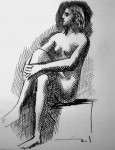
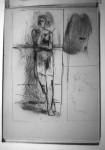
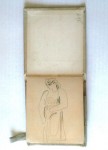
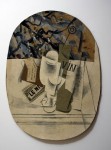
I hate this story for the evil and greed it reveals in people- particularly the most undeserving people- those who inherited the name but inherited no humanity or talent.
I don’t know if we can say for sure that Claude is driven by greed. It’s certainly a very unusual circumstance, and it’s plausible that he genuinely believes the Le Guennecs either took advantage of his ailing father and his wife, or else straight-up stole a huge amount of stuff while installing alarm systems.
It seems a bit extreme that the police should just take the works based on the son’s suit. I can see an injunction from selling them, if there is some shred of proof that a crime has been committed.
I guess the trove is evidence? I’m not really sure how the law works in this instance. It’s not just a regular lawsuit as we know them here, obviously, or the police wouldn’t be involved at all. The underlying allegation is criminal.
My initial assumption was that the police are simply taking the rich-son-of-famous-guy’s word against the retired electrician’s. I hope that isn’t the case though and that there is some basis for impounding the paintings beyond the son’s word. Basically, what bothers me is, if the situation was reversed and the electrician were accusing the son of theft, would the police act in the same way?
Just from the information provided however, it doesn’t seem as if there is any evidence of theft. Grounds for suspicion perhaps, but how to say a crime has been committed when until now the property in question was unknown?
I think the impetus to immediate confiscation was just how large and important the disputed items are. As far as them taking the word of the rich guy, from what I understand, the rich guys (it was actually all 6 of Picasso’s heirs) pressed charges and the Central Office of the Fight Against the Traffic of Cultural Property (OCBC) acted immediately to ensure none of the works would be sold or removed on the quick.
Do you have to have evidence beyond circumstantial in the US to press possession of stolen property charges against people you know are in possession of something that used to belong to someone else? Like if you see someone on the street dripping in jewels that without question belonged to your deceased parents, can’t you press charges against them for holding stolen property even if there’s an outside chance it was a gift?
I don’t know for sure, but it seems like police here would confiscate the items too until the case is decided one way or another.
I’m not a lawyer, obviously. However it seems to me that (based on the evidence available) that there isn’t proof that a crime was committed. There is just as much evidence that the electrician’s story is correct (that is virtually none) than it is false. The party who could confirm or deny the story is dead. Unless there is some evidence unknown to us, it’s not even one man’s word against another’s – but rather one man’s word and the other doesn’t believe it.
Ya, I really don’t know what the premises of the criminal case are. Things are more complicated when cultural patrimony is involved, though. I suspect that’s more of the impetus behind immediate confiscation than Claude’s wealth vs. Pierre’s lack thereof.
Claude says his father never would have given the paintings away, but if he actually listened to the La Guennecs, he might notice they never claimed that. The wife gave them away.
Spouses are known to do things like that. There are just too many laying around the house, and they’re not his best work, and he’s not doing anything with them. They’re just taking up space and collecting dust. Why not hand a few over every now and then to this man who’s willing to take them instead of money? He’s a nice guy. Let him make a small fortune off them.
Claude should be grateful the man brought them back and let it go.
He didn’t really bring them back, though. He wanted them authenticated, not to turn them over to the Picasso Administration.
Also, does Le Geunnec claim he received the works in lieu of payment? I haven’t read that in any of the articles. Since by that time Picasso was enormously rich and famous and everything he made sold for huge gobs of money, I seriously doubt there was any question of Pierre being “willing” to take them instead of cash.
I know wives do that sort of thing, but probably not so much the wives of hugely famous artists who know that every scrap they ever doodled on could be worth millions and who make a point of giving gifts in a very punctilious manner. It’s by no means impossible, but it’s also not entirely plausible.
I don’t know why Claude refers to Pablo as the putative donor rather than Jacqueline. It’s odd. Perhaps he assumes that she wouldn’t have done it without her husband’s explicit permission?
Claude still has no talent… and very little humanity.
On that I can’t comment. I’d never even heard of him until this story came out.
A quick look at the wiki entries for Pablo and his last wife suggest that there was plenty of bad blood between Claude and Jacqueline. He was barred from the funeral, and they fought over the estate. The le Guennecs may be experiencing late unlucky fallout from that.
Anyway, when the mess settles it will be nice to have these works properly dosumented.
I read about their conflict in the wiki entries but I don’t think Claude is just giving the Le Guennec’s the stinkeye because they got the works from Jacqueline. He seems genuinely incredulous that either Picasso or his wife would ever give away such a huge, varied cache of works. In the interview he gave to Liberation, he says she could well have given small items as gifts, but never a trove like this.
There’s also some ambiguity in Pierre’s story. Apparently he told the Picasso Administration when he took the works in for authentication that “the master” gave them to him, but then appended “or his wife” when investigators asked him.
How is it you can’t comment on his clear lack of humanity and talent by his clearly small, selfish, and painful actions and lack of adding anything to this world beyond stripping resources from it for his own rewaqrd… but you can ascribe something to the inner workings of his heart as “genuinely incredulous?”
He’s a rat.
Simply because it’s not clear to me that his motivations are small and selfish and I have no idea what his talents are or are not. Obviously all these things are incontrovertible to you, but I don’t see anything in the record that suggests it is the sole explanation for what’s going on here.
Nor did I ascribe any such absolute clarity to his incredulous reaction. I said he seemed genuinely incredulous, as in that is the impression his interview conveyed to me. He makes a fleshed-out argument grounded in his father’s patterns of behavior and why he finds the idea that this was a gift so uncharacteristic. If you have a factual counter-argument beyond impugning the man’s character and abilities — about which I know nothing whatsoever — then by all means present it.
For instance, do you have information that Picasso did in fact give large numbers of undocumented works to people, that he didn’t always sign and date his gifts, that he was in the practice of giving away the paper trail of important later works? Is Claude just making all of that up, according to you?
While I don’t know Claude and have never really heard of him, nor do I know the Le Guennec’s, their story is so flimsy as to be literally unbelievable. Even IF in fact we can suspend disbelief and accept that Picasso (or his wife) would have given 271 valuable pieces of art to the Le Guennecs without signing them or documenting their whereabouts in return for the installation of a security system – what makes literally no sense at all is that the Le Guennecs would have kept this a secret for however many years and kept the artworks in a trunk in the garage . . . . If you have a picasso, it’s up on the wall. You tell all your friends about it. If you don’t like the piece, you sell it for a lot of money.
Right. You can’t help but wonder if they weren’t hiding out until the statute of limitations on the theft expired. From what I gather, Claude was able to press charges on the grounds that the crime had been ongoing all these years because of the cover-up.
I TOTALLY AGREE AND LOVED HOW YOU PUT IT!